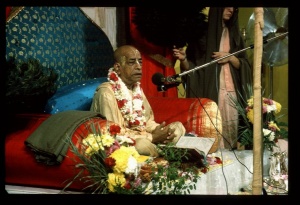CC Adi 7.89-90

A.C. Bhaktivedanta Swami Prabhupada
TEXTS 89-90
- sveda, kampa, romāñcāśru, gadgada, vaivarṇya
- unmāda, viṣāda, dhairya, garva, harṣa, dainya
- eta bhāve premā bhaktagaṇere nācāya
- kṛṣṇera ānandāmṛta-sāgare bhāsāya
SYNONYMS
sveda—perspiration; kampa—trembling; romāñca—standing of the hairs on the body; aśru—tears; gadgada—faltering; vaivarṇya—changing of bodily color; unmāda—madness; viṣāda—melancholy; dhairya—patience; garva—pride; harṣa—joyfulness; dainya—humbleness; eta—in many ways; bhāve—in ecstasy; premā—love of Godhead; bhakta-gaṇere—unto the devotees; nācāya—causes to dance; kṛṣṇera—of Lord Kṛṣṇa; ānanda—transcendental bliss; amṛta—nectar; sāgare—in the ocean; bhāsāya—floats.
TRANSLATION
“‘Perspiration, trembling, standing on end of one’s bodily hairs, tears, faltering voice, fading complexion, madness, melancholy, patience, pride, joy and humility—these are various natural symptoms of ecstatic love of Godhead, which causes a devotee to dance and float in an ocean of transcendental bliss while chanting the Hare Kṛṣṇa mantra.
PURPORT
Śrīla Jīva Gosvāmī, in his Prīti-sandarbha (66), explains this stage of love of Godhead: bhagavat-prīti-rūpā vṛttir māyādi-mayī na bhavati. kiṁ tarhi, svarūpa-śakty-ānanda-rūpā, yad-ānanda-parādhīnaḥ śrī-bhagavān apīti. Similarly, in the 69th text he offers further explanation: tad evaṁ prīter lakṣaṇaṁ citta-dravas tasya ca roma-harṣādikam. kathañcij jāte ’pi citta-drave roma-harṣādike vā na ced āśaya-śuddhis tadāpi na bhakteḥ samyag-āvirbhāva iti jñāpitam. āśaya-śuddhir nāma cānya-tātparya-parityāgaḥ prīti-tātparyaṁ ca. ata evānimittā svābhāvikī ceti tad viśeṣaṇam. Transcendental love of Godhead is not under the jurisdiction of the material energy, for it is the transcendental bliss and pleasure potency of the Supreme Personality of Godhead. Since the Supreme Lord is also under the influence of transcendental bliss, when one comes in touch with such bliss in love of Godhead, one’s heart melts, and the symptoms of this are standing of the hairs on end, etc. Sometimes a person thus melts and manifests these transcendental symptoms yet at the same time is not well behaved in his personal transactions. This indicates that he has not yet reached complete perfection in devotional life. In other words, a devotee who dances in ecstasy but after dancing and crying appears to be attracted to material affairs has not yet reached the perfection of devotional service, which is called āśaya-śuddhi, or the perfection of existence. One who attains the perfection of existence is completely averse to material enjoyment and engrossed in transcendental love of Godhead. It is therefore to be concluded that the ecstatic symptoms of āśaya-śuddhi are visible when a devotee’s service has no material cause and is purely spiritual in nature. These are characteristics of transcendental love of Godhead, as stated in Śrīmad-Bhāgavatam (SB 1.2.6):
- sa vai puṁsāṁ paro dharmo yato bhaktir adhokṣaje
- ahaituky apratihatā yayātmā suprasīdati
“That religion is best which causes its followers to become ecstatic in love of God that is unmotivated and free from material impediments, for this alone can completely satisfy the self.”